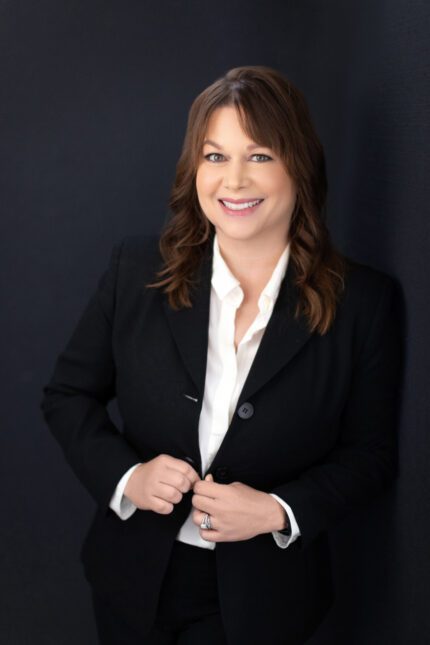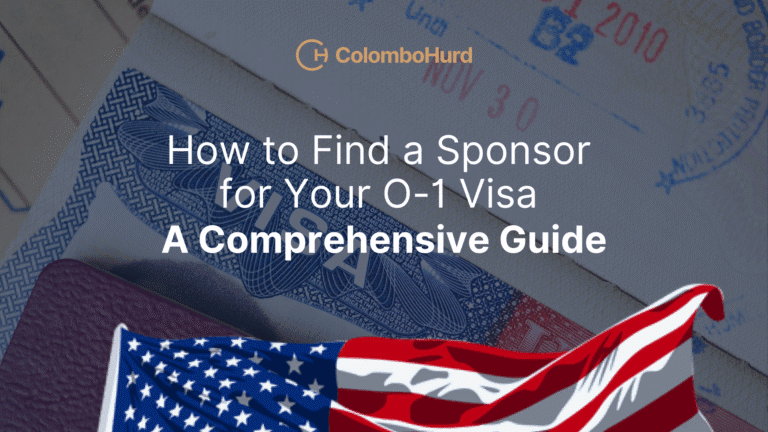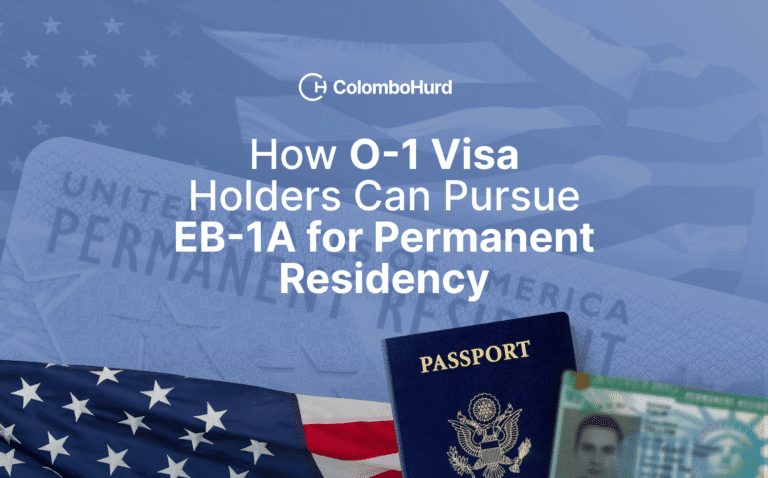The O-1 Visa: Individuals with Extraordinary Ability or Achievement is a temporary, non-immigrant visa for individuals who have been recognized nationally or internationally for their extraordinary ability or achievement.
An O-1 visa petition must be filed by a petitioner, or visa sponsor. Your O-1 visa sponsor can be a U.S. employer, U.S. agent, or foreign employer through a U.S. agent. Securing sponsorship is a crucial step in obtaining an O-1 visa. Read on for tips to find and select a sponsor for your O-1 visa.
Responsibilities of the Sponsor
Before you begin your search, it’s important to understand exactly what an O-1 visa sponsor does. The sponsor must file a petition (Form I-129) on your behalf with the U.S. Citizenship and Immigration Services (USCIS). The sponsor is typically responsible for providing evidence of your extraordinary abilities, and of their legitimate need for your specialized skills.
If you are an artist, for example, your sponsor may be a production company or gallery. If you work in the sciences, your sponsor could be a university or research institution. The key is that your O-1 visa sponsor needs to be able to demonstrate that you will be working in your field of expertise in the U.S.
Make sure your sponsor understands the O-1 visa sponsor requirements, including:
- Filing Form I-129 on your behalf at least 45 days before the date of employment and less than one year before they need your services
- Providing required evidence, including: information about the work in the U.S., background and financial information of the sponsor.
- Demonstrating your extraordinary ability or achievement
Who Can Be Your Sponsor?
Selecting a sponsor for your O-1 visa requires careful consideration and research. Eligible petitioners include:
- U.S. companies or organizations; or
- A U.S. agent, who may be used a sponsor when the beneficiary is traditionally self-employed or seeks short-term employment with numerous employers, or when a foreign employer authorizes the agent to act in its behalf. O-1 visa agents may be:
-
- Direct Employer: Actual employer of the beneficiary
-
- Dual Representative: Representative of both employer and beneficiary
-
- Authorized Agent: Authorized to act on behalf of the employer
While you cannot sponsor your own petition, a separate legal entity that you own, such as a corporation or limited liability company (LLC), may file a petition on your behalf. For further details on this recent update to the O-1 sponsorship process, read our recent analysis of the USCIS amended guidance on O-1 Visa eligibility.
Finding the right sponsor depends largely on your area of expertise. Here are some common categories and examples of potential sponsors for different fields:
| Industry | Potential Sponsors |
| Arts & Entertainment | Production Companies, Talent Agencies, Event (Concert, Performance, Festival) Organizers, Film Studios |
| Sciences & Research | Research Institutions, Universities, Tech Companies, Government Agencies |
| Business & Entrepreneurship | Corporations, Startups |
| Athletics | Sports Teams, Organizations, Athletic Clubs, Management Agencies |
Agents as Sponsors
An O-1 visa agent can be a person or entity that represents you in the U.S., rather than a specific employer or organization. The agent acts as an intermediary between you (the O-1 visa applicant) and multiple employers or contractors.
Using an agent to represent multiple employers is common for beneficiaries in fields where freelance work or short-term contracts are typical, such as actors, artists, consultants, and athletes. An agent can file a blanket petition, which allows you to work for multiple employers or contractors during the visa period. Under a blanket petition, the agent can represent you across multiple engagements, instead of filing separate visa petitions for each employer or project.
Petitions filed by agents are subject to additional O-1 visa agent requirements. For example, when the petition involves multiple employers, the following supporting documents must be included:
- An explanation of the agent’s role in representing the applicant
- Evidence of the agent’s experience and legitimacy in representing clients in the applicant’s specific field
- A complete itinerary specifying dates of each activity, employer names and addresses, and the names and addresses of engagement locations
- The contracts or other agreements between the employer and beneficiary
- An explanation from the agent on the terms and conditions of the employment
Additionally, an agent who works with many clients in your field can help create a network of potential employers. If your agent is well-established in the industry, they may have strong relationships with companies or individuals that are already familiar with O-1 visa requirements and are willing to hire you.
Using an agent as a sponsor for an O-1 visa is an excellent option for individuals in industries where freelance or project-based work is common, but there are additional O-1 visa agent requirements. While the process can be more complex than applying with a traditional employer, the benefits of flexibility and industry representation often make agents an ideal choice for many O-1 visa applicants.
Finding a Sponsor
Finding a sponsor for your O-1 visa is often one of the most challenging aspects of the application process.
To find a sponsor for your O-1A visa, consider companies or organizations in your industry that may be interested in your skills. You can find potential sponsors through networking, online research, via professional associations, and using social media like LinkedIn to connect with potential sponsors. Your chances of finding a sponsor greatly increase if you have a strong professional network.
Ineligible petitioners include:
- Beneficiaries themselves
- Family members or relatives
- Companies without a U.S. presence
When reaching out to potential sponsors, it’s important to showcase your exceptional skills and achievements. Prepare to demonstrate your expertise through a portfolio, list of awards, publications, or significant project results. You should also provide a clear explanation of your work and highlight the need for your presence, as your sponsor will need to highlight how hiring you will advance their work in a way that is otherwise impossible to achieve.
While you cannot self-petition for an O-1 visa, the USCIS has recently clarified that it is possible to apply for an O-1 visa through a separate legal entity that you own. To do so, you must demonstrate that there is an employee-employer relationship between you and your own company – meaning that there is at least one person who can fire you. For the latest information on this and other USCIS updates to the O-1 visa program, reference our recent analysis of the USCIS amended guidance on O-1 Visa eligibility.
Conclusion
Securing O-1 visa sponsorship requires determination, networking, and a well-prepared case showing why you’re an extraordinary talent in your field. By understanding the responsibilities and O-1 visa sponsor requirements, identifying potential sponsors, building your professional network, and showcasing your unique abilities, you can increase your chances of securing the support needed for your O-1 visa application.
Whether through your own separate legal entity, traditional employers, or agents, finding the right sponsor can unlock opportunities for advancement and innovation.
For a free evaluation of your O-1 visa eligibility, consult the experienced immigration professionals at Colombo & Hurd.





